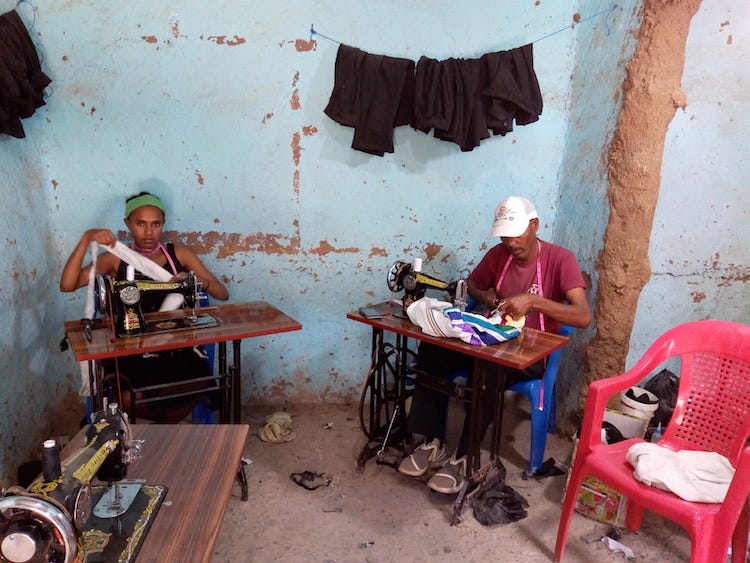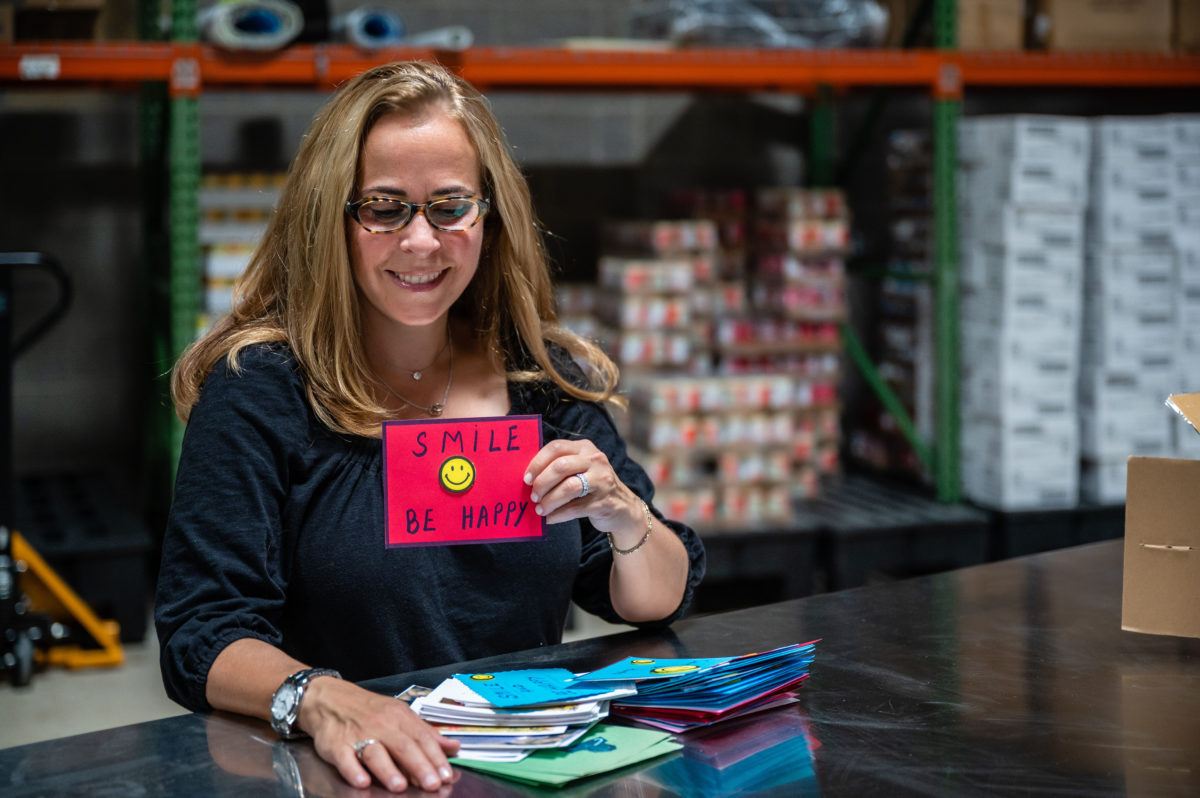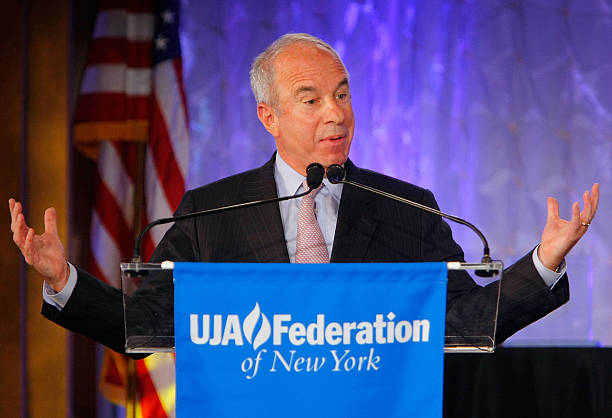Your Daily Phil: The ongoing Ethiopian aliyah, explained + Battling hunger in Baltimore
Good Tuesday morning!
The advancement by the Israeli government of a national budget on Monday for the first time since 2018 is hopeful news for the nonprofit sector, even though the Knesset has not yet approved the plan, Michael Bloch, a co-founder of Israel Impact Partners, a nonprofit consulting firm, told eJewishPhilanthropy.
“If it passes, it will unfreeze a number of important programs, renew funding that had been put on hold, and initiate reforms which policy-oriented nonprofits have been advocating for,” he said. “All in all, the first budget in three years is something to be celebrated!”
Leading Edge, the leadership development nonprofit that serves Jewish communal organizations, has made its plans to return to the office twice a week starting in October “officially uncertain” due to the spread of the coronavirus’ Delta variant, Leading Edge CEO Gali Cooks told eJewishPhilanthropy. The organization will determine later in the season whether it will implement its original plan or postpone.
“We had planned an in-person staff retreat for mid-September, but we’re now waiting until mid-August to make a final call about whether to keep that retreat in-person or meet virtually,” Cooks said. She has heard similar stories from others in the field who might reconsider their plans as they monitor public health developments.
EXPLAINED BY EJP
The Ethiopian aliyah is not over, it turns out


Meketa
In its first state budget in three years, the government of Israel has approved NIS 150 million ($46 million) for immigration and settlement, some of which is earmarked to bring 3,000 Ethiopians to Israel, The Jerusalem Post reports — yet in 2013, the government declared that the Ethiopian immigration, or aliyah, was complete. Nonprofit leaders spoke with eJewishPhilanthropy‘s Helen Chernikoff about why the Ethiopian aliyah is ongoing almost a decade later, the challenges involved in bringing it to a successful conclusion and why Ethiopians still need the help of world Jewry.
Didn’t the Ethiopian aliyah happen in the 1990s — and wasn’t it a great, dramatic success?
In 1991, the Israeli government and the Jewish Agency, with the help of the American Jewish Joint Distribution Committee (JDC) and financial support from American federations, conducted Operation Solomon, which brought about 14,000 Ethiopians to Israel within 34 hours on military and civilian airplanes. That operation was the culmination of many years’ worth of work by the Jewish Agency, the Mossad and the Israel Defense Forces (IDF) to rescue Ethiopian Jews from an authoritarian regime. One historian claims to have documented an effort by Ethiopian Jews to reach Israel in 1869.
Did Operation Solomon leave anybody behind?
The government decided not to bring a group of people, many of whom were Falash Mura, Christians of Jewish descent who had been converted under duress, said Joe Feit, chairman of the nonprofit Struggle to Save Ethiopian Jewry (SSEJ). This population numbered about 2,000 at the time, and was settled in two Israeli government compounds, one in Addis Ababa and one in Gondar. The new immigrants and their allies in Israel advocated to bring those people, as well, due to family ties between those who had left for Israel and those who remained. The group that stayed became the nucleus of an internal Ethiopian migration as word spread that immigration to Israel was possible. That migration continues to this day, Feit said, and when some leave for Israel, the rest hope more fervently that they will be next.
Which organizations are still helping these communities, and how do they support themselves?
The JDC provided medical care for aspiring immigrants in Ethiopia until around 2013, when the government declared a natural end to the aliyah, when the Joint closed its clinics, said a JDC spokesman. The Jewish Agency maintained a skeleton staff, and when the government decided to again approve immigration from Ethiopia, they facilitated it, which is their role today. Meketa and SSEJ provide humanitarian assistance. That aid is needed, Curtis said, because the community has lost the agricultural skills that sustained previous generations during the two decades it has been waiting to leave. Meketa tries to help by providing skills training, such as tailoring, microloans and education. The American chapter of Meketa should be cleared by the Internal Revenue Service to begin fundraising by October, and the group has a goal of $50,000. “That goes a long way in Ethiopia,” Curtis said. SSEJ provides food assistance, medical care, childcare and education for both children and adults, by permission of the local and regional government, on an annual budget of $1.5 million, Feit said. The Jewish Agency helps raise funding for some of SSEJ’s activities.
CHARM CITY
Accounting for childhood hunger in Baltimore


Hilary Eldridge for JewishInsider
It’s Friday afternoon in Baltimore City, and kids are bounding out of school, excited for the weekend. They had breakfast and lunch that day at school, but their next meal is uncertain. And there is Lynne Kahn standing in that “hunger gap” breach, like a nutrition guardian angel. Tucked inside the at-risk students’ backpacks are sandwiches and snacks provided by her expanding anti-childhood hunger nonprofit. The longtime accountant is now keeping tabs on something more precious than an average CPA’s balance sheet. “It’s so rewarding to be able to do what you are meant to be doing,” Kahn told Jewish Insider’s Gabby Deutch in a recent interview from the large warehouse that her nonprofit, Baltimore Hunger Project, just moved into.
To the point: Baltimore Hunger Project’s mission is simple — “eliminating weekend childhood hunger,” Kahn explained. “We focus on bridging the hunger gap from Friday afternoons to Monday mornings. The kids we support are the ones who receive free breakfast and lunch Monday through Friday at school. And when they go home, on the weekends, we help supplement what food they may have at home.”
Started in the garage: Before starting Baltimore Hunger Project, Kahn used to organize friends to meet in her garage on the weekends to make sandwiches for local women’s and children’s shelters. “Lynne’s Garage,” as she named the project, kept her busy for 10 years, but she wanted to go bigger. In 2014, she launched her nonprofit to feed some of Baltimore’s most at-risk kids every weekend. Seven years later, Baltimore Hunger Project is a one-woman, volunteer-driven operation that raises hundreds of thousands of dollars a year and fed more than 1,000 kids over the past year.
Jewish connection: “The Jewish community certainly has supported our work, for sure, both in talent and treasure,” Kahn noted. Baltimore Hunger Project has partnered with The Associated (Baltimore’s Jewish federation) to find volunteers through the organization’s Jewish Volunteer Connection, which matches interested community members with volunteer projects.
Intergenerational values: “I think a lot of the work that she does through Baltimore Hunger Project, to me, is really kind of mitzvah-oriented work. It just comes from that place of understanding what it means to make the world a better place and the responsibility you have to do that,” added Rabbi Steven Schwartz, the senior rabbi at Baltimore’s Congregation Beth El. “Her parents are active and engaged, involved in the shul, they come regularly. Her in-laws as well. Her kids are Jewishly connected also. It just gives you a sense of how those values get transmitted through the generations of a family.”
EMBASSIES OF THE JEWISH PEOPLE
You want to fight antisemitism? Save Jewish heritage


Casale Monferrato synagogue Italy via Foundation for Jewish Heritage.
“I want to propose what has been a dramatically overlooked weapon in the arsenal to tackle antisemitism; one that might even offer the best chance of success. It relates to a remarkable resource that exists in many countries yet has been largely ignored – the Jewish heritage sites that dot these landscapes,” writes Michael Mail, chief executive of Foundation For Jewish Heritage, in an opinion piece for eJewishPhilanthropy.
Our heritage: “The story of the 20th century is that the Jewish people no longer live where they had lived, through migration, expulsion and Holocaust. The places that were Jewish heartlands for centuries have all but disappeared. What remains is a vast physical heritage, the patrimony of the Jewish people and a profound testimony which, without a community of users, has been suffering from neglect and destruction.”
Local heritage: “Such places provide an inspiring setting, and have the space to deliver substantial content on Jewish history, faith and traditions, calendar and life cycle, promoting knowledge, understanding and empathy. They also inevitably address the Holocaust, delivering a profound message on just where prejudice unchecked can ultimately lead, powerfully underscored by the very location itself… What makes these centres especially effective is that this is local heritage, indigenous, authentic, and physically situated within a building passed by residents every day.”
NEW NARRATIVE
Expanding not diluting: Embracing Jewish+ families


“For decades, Jewish educators and scholars have identified that the words ‘interfaith’ and ‘intermarriage’ do not work. The word ‘interfaith’ is inadequate; it is also often inaccurate… People who do not identify as Jewish do not necessarily identify with another faith,” write Alison Weikel and Rachel Weinstein White, cohort members of the Hebrew Union College – Jewish Institute of Religion executive master’s program in Jewish education, in an opinion piece for eJewishPhilanthropy.
Language matters: “Scholars, educators, and community leaders commonly advance the idea that intermarriage is something we must ‘stand against’ and figure out how to prevent. And yet the latest Pew population study shows that 72% of Jews married since 2010 are married to non-Jews. How can we as educators continue to use such damaging, unfavorable, and- quite frankly- fatalistic language to describe such a large percentage of the families engaged in our learning programs? And what about the many, many more who are unengaged because they feel marginalized?”
New narrative: “To that end, we’re trying on for size the following terms: ‘Jewish Adjacent’: describes a member of a Jewish family who does not identify as Jewish. ‘Jewish+ Family’: a Jewish family with at least one family member who is ‘Jewish adjacent.’”
Worthy Reads
All In: In 2017, the Nathan Cummings Foundation became the largest grant-making organization to move its entire endowment into “impact investments” judged to earn financial return while also advancing its mission, writes Jaimie Meyer in a Chronicle of Philanthropy piece that shares what the organization has learned. Making the transition wasn’t easy, in large part because of a dearth of qualified advisors, she acknowledges, yet it has boosted the foundation’s bottom line in addition to supporting its mission. “We could see no good reason to continue using just 5% of our assets — the federally required minimum for spending on grants — to spark impact when we could use 100%,” Meyer wrote. [ChroniclePhilanthropy]
The ACE Card: Writing in The Hill, Elizabeth McGuigan articulatesthe charitable sector’s concerns about Sens. Angus King (I-ME) and Charles Grassley (R-IA)’s “Accelerate Charitable Efforts Act,” which she claims would have the opposite effect of its ostensible purpose. The law will deter people from setting up and donating to donor advised funds (DAF), even though all the money in DAFs is committed to charity, and it will also impose new administrative burdens on charities that receive funds from DAFs, she writes. “This bill is a solution in search of a problem, yet there are broadly-supported ways that Congress can effectively increase charitable giving,” concludes McGuigan, such as expanding the charitable deduction. [Hill]
School’s Out: A new data release from the U.S. Education Department reveals that the higher education industry is still shrinking, and that in the last academic year, more public and private nonprofit two and four-year schools closed than for-profit institutions, bucking the usual trend, reports Doug Lederman in Inside Higher Education. Federal recovery funds have helped scores of colleges that were already under financial strain before the coronavirus pandemic, but experts expect the pace of closures and mergers will accelerate again once the boost from federal stimulus funds fades, Lederman writes. [InsideHigherEd]
Community Comms
Be featured: Email us to inform the eJP readership of your upcoming event, job opening, or other communication.
Word on the Street
A four-day Camp Tawonga introductory session with 200 children enrolled has been canceled due to a surge in COVID cases in the region… Rabbi Sharon Kleinbaum of Manhattan’s Congregation Beit Simchat Torah was announced as the Biden administration’s nominee to the U.S. Commission on International Religious Freedom… The Jewish Federations of North America has canceled the in-person component of its 2021 General Assembly, scheduled for October, over concerns over COVID-19 and its new variants… The NonProfit Times released its twenty-second annual Power and Influence Top 50 list… A study by Nielsen and RespectAbility found that respondents with disabilities were 8% more likely to say that a television show’s portrayal of a character with a disability was inaccurate… Sherry Herring, a Tel Aviv shop known for its herring sandwiches, is opening a New York branch at 245 West 72nd Street…
Pic of the Day


UJA-FEDERATION OF NEW YORK
Henry Kaufmann Campgrounds unveiled a new multimillion dollar aquatic complex at its Long Island site in Wheatley Heights last week.
Birthdays


Jemal Countess/Getty Images
EVP emeritus of the UJA-Federation of New York, John S. Ruskay…
Retired Head Coach of both the NFL’s Kansas City Chiefs and the Buffalo Bills, member of the Pro Football Hall of Fame, Marv Levy… English actor, author, playwright and theatre director, Steven Berkoff… Retired regional director and development director in the Cleveland office of the ADL, Anita Gray… Former chairman and CEO of the NYC office of commercial real estate brokerage firm Savills, Mitchell S. Steir… Voice actor in dozens of Disney films, video games and television programs, known professionally as Corey Burton, Corey Gregg Weinberg… General campaign chair for the Jewish Federation of Los Angeles and board member of JFNA, Orna Amir Wolens… Former aide to Senator Schumer then senior adviser to President Clinton at the White House, now President of DC-based Freedman Consulting, LLC, Thomas Z. Freedman… Co-founder of Pushkin Industries podcast company, Jacob Weisberg… Israeli filmmaker, producer and director, Ilan Moskovitch… Developer of the 65-story Trump International Hotel in Toronto (since renamed) and former president of the Jewish Russian Community Centre of Ontario, Alexander Shnaider… VP of community planning at the Jewish Federation of Broward County, Evan Goldman… Emmy Award winning sportscaster, Suzy Shuster… Editorial page editor of the New York Daily News, Josh Greenman… U.S. Senator Chris Murphy (D-CT)… Chief advancement officer at the National September 11 Memorial & Museum, Joshua Cherwin… General counsel at Wentworth Management Services, Brian Morgenstern… Executive editor of the Washington Examiner magazine, Seth Mandel… Director of national security policy and international government affairs at SoftBank, Jeffrey A. Dressler… Director of philanthropic outreach for the southern division of the Anti-Defamation League, Erica Greenblatt… Podcast host of “Us Among the Israelis,” Caroline Keller-Lynn… Congressional liaison development associate at Christians United For Israel, Liliya Bychuk… Director of grants and programs at The Natan Fund, Adina Poupko… Executive director of the Reducetarian Foundation, Brian Kateman… Fashion model, Karlie Elizabeth Kloss… Curated content writer and editor at the Financial Times, Emily Goldberg… First round pick of the Atlanta Braves in the 2020 Major League Baseball draft, Jared Shuster… Social secretary to the Israeli Ambassador to the United States, Ariana Kaufman… Talent guide for venture capital portfolio companies of FirstMark, Leigh Bonner Levine…
Email Editor@eJewishPhilanthropy.com to have your birthday included.








